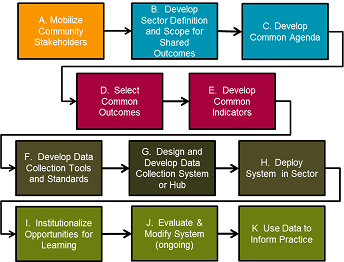Recently, my FSG colleagues and I had the fortune of working with social sector leaders in Greater Cincinnati to help them advance their measurement and evaluation work. What impressed me the most about these leaders was their boldness to take on change in entire social sectors: education, workforce, health, neighborhood development, and the arts.
The Greater Cincinnati area has a strong history of collaboration and innovation. Leading funders such as the Greater Cincinnati Foundation and the United Way of Greater Cincinnati wanted to further build momentum to advance collective efforts by focusing on shared measurement. They saw opportunities in multiple sectors and wanted to assess the readiness of five key sectors for additional collaboration.
Some sectors, such as education, had made great progress as described in FSG’s “Channeling Change: Making Collective Impact Work” (2012). Other sectors were beginning their journey and building momentum. The arts sector was one such example. A leading organization in the sector is ArtsWave. ArtsWave is one of the oldest and largest arts support organizations in the country. It serves as a funder for over 100 arts organizations in the region as well as an advocate on behalf of the arts.
In 2011, ArtsWave designed what they called an “impact agenda” that included a limited set of desired outcomes for arts organizations as well as ultimate beneficiaries – the people of Greater Cincinnati. Outcomes included a more connected and engaged community, improved quality of life for key demographic groups, and employment in specific industry sectors. During our shared outcomes project with the five Greater Cincinnati sectors, FSG developed a “roadmap” for shared measurement (above).
Many of the lessons learned from this project aligned with other reports of best practices for developing measurement systems. For example, from an account of neighborhood revitalization in a mid-Atlantic region, similar lessons learned included 1) establishing or maintaining trusting relationships, 2) identifying critical support organizations, and 3) using data for continuous learning, not solely for reporting or accountability purposes. Using data to inform practice and improve programs was also commonly noted. Grantmakers for Effective Organizations has also distilled essential elements of useful evaluation.
But what was new in our project and different than past efforts? Our project highlighted the importance of ways to facilitate conversations across entire sectors regarding shared outcomes. New lessons learned from working across numerous stakeholders included: 1) scoping the boundaries of a sector, 2) identifying appropriate participants, and 3) establishing advisory or governance groups with clearer expectations for involvement and responsibilities. My FSG colleagues have blogged about similar themes in the Greater Cincinnati context. Future observations and project experiences should identify what other principles and tools apply to sector-wide social change efforts.
Finally, one really important lesson that we learned was to “start where you’re at.” Data and outcomes are often more concrete topics of conversation that can lead to other important themes needed for community transformation. Taking a first step helps build momentum to move down the path of social change. As the work in Greater Cincinnati unfolds, we’re all looking forward to seeing how sector-wide change can be catalyzed by using data collectively to track progress and inform practice.

